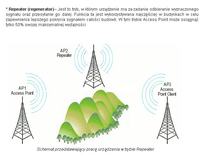I have a question about how wifi repeaters work. I need to increase the range of the wifi network, but it is a controlled and secured network in such a way that only specific MAC addresses have access and it is generally inadvisable to combine things, such as connecting a laptop which will be a hotspot for other devices. It is not an option to set up a router that would be visible in the network and then transfer the Internet connection to other devices. Thought I'd put a repeater or a few in a row if needed. I always thought they were invisible and just stupid signal amplifiers. If this were the case, the device connected to the repeater would be seen by the network in exactly the same way as if it were connected directly to the "mother's network". But I have just read that this new "extended" network often has to have a different SSID than the "mother", which means that such a repeater is practically a router and will have its own IP, MAC etc ...? How is it in the end?



